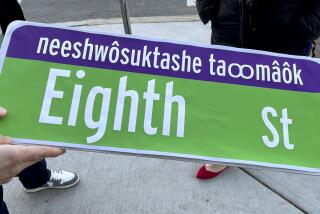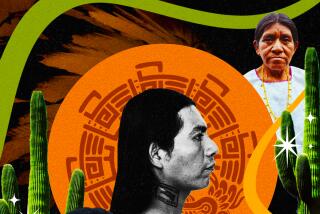Culture : Pidgin Talk <i> Nambawan</i> for Millions : In Papua New Guinea, as well as other Pacific nations, the English-based language is no laughing matter.
- Share via
PORT MORESBY, Papua New Guinea — For a serious linguist in a land with 854 languages at last count--one-third the world’s total--Sakarepe Kamene is surprisingly disgruntled.
The problem is pidgin, the English-based national language. Almost no one, except other pidgin speakers, takes it seriously.
“It’s like I speak funny English and you laugh at me,” complains Kamene, a senior lecturer in socio-linguistics at the University of Papua New Guinea.
Not at first. Foreign visitors are initially shocked when addressed as masta , although it’s proper pidgin. Women are known as marys. Both words, like much of pidgin, are derived from the English spoken on sugar cane and coconut plantations in colonial times, or the taim bilong masta.
Even odder to American ears, children are called pikininis. Don’t take offense: Britain’s Prince Charles didn’t when he was formally introduced as nambawan pikinini bilong misis kwin, or the No. 1 son belonging to the queen. Princess Anne was the nambawan gel pikinini bilong kwin.
Although often ridiculed as broken English, baby talk or worse, pidgin (or Tok Pisin as it’s known here) is a legitimate if unusual language spoken by 2 million of the 3.5 million people in this young nation. Similar simplified languages are widespread in West Africa, and for similar reasons: They evolve when mutually incomprehensible groups collide and need to talk.
“It’s no one’s language,” explains Kamene. “It’s a contact language between different language groups.”
Here in the Western Pacific, European traders, whalers and missionaries sought a way to communicate as they searched for sandalwood, slaves and souls in the 19th and early 20th centuries. The problem was especially pronounced in what is now Papua New Guinea, one of the last places on Earth to be explored or colonized. Hundreds of tribes and ethnic groups lived--and still live--in linguistic isolation, cut off from neighbors and normal cultural contact by steep mountains, dismal swamps and fierce tribal wars.
Pidgin was the result. Three-fourths of the 1,600-word vocabulary is from English (which has about 6,000 words). Even the term pidgin is pidginized; it’s a mispronunciation of business. Most of the rest are from German and Kuanua, a local tongue. Spelling is phonetic, so words are best understood spoken slowly aloud.
To mess up, or bugger up as Australians say, is bagarap. To shut up is to sarap. Robbers, known as rascals , are blamed for the brekanenta problem. Escaping prisoners, however, are part of the brekanouta problem. It’s why there are so many polis rodbloks. Don’t forget your driver’s laisens, and be polite: say plis and tenkyu.
Running late? Better hariap. No electricity? It’s another blekaut. You can read about it in the niuspepa, preferably in the weekly Wantok or One Talk. You can recite the Lord’s Prayer: Givus tede our delibred an pogivus trespasis. Anyway, no waries mate, for tumora is another day.
It sounds simple, but it’s not. Nor is it simply substandard English. Grammar and sentence structure are distinctly Melanesian. “It’s not English, that’s definite,” warns Kamene, who also speaks Zia, his native tongue, plus Kotae, Binadare, Suena and Yakora, all separate local languages. “It’s not our local language. It’s a language of its own.”
Pidgin dialects are national languages in the nearby Solomon Islands and Vanuatu. Pidgin also is used in other parts of the Pacific, including northeast Australia and rural Hawaii.
Halfway around the world, the confluence of colonial and native peoples also produced pidgin languages. In West Africa, Cameroon uses an English-based pidgin, for example, liberally mixed with German, French and local words, to cut through its 285 tribal languages. Variations are spoken in Nigeria, Benin, Ghana and Gambia. Creolized languages, which are advanced forms of pidgin, are spoken as Krio in Sierra Leone and broad Creole in the Caribbean, especially Jamaica.
Papua New Guinea’s other national languages are English and Police Motu. It too is a pidgin tongue, named after colonial Australian constables simplified and spread an indigenous Port Moresby language called Motu. Under the law, only English is taught in schools, however.
Despite what the gavmen says, most pipols prefer pidgin. They go to wok each moning for the big bos , unless they nogat wok. They can kick a soka ball, ple tenis or go see a piksa bilong bigpela man-- an adults-only film. If the tropical sun is tuhat , they can relax daunim koldies, or drinking cold beers, particularly on the wikend.
Need cash? Go to the nambawan haus moni. Food? Shop at Supa Valu. Sick? A doctor in the haus sick can treat bele ran-- diarrhea--and a dentist can fix fols tits-- false teeth.
Laugh if you will. In May, 1984, Pope John Paul II flew to Mt. Hagen, a rugged frontier town in the Highlands. As tom-toms thumped and clouds of orange smoke were lit to ward off pagan spirits, the pontiff surprised the crowd by celebrating Mass in pidgin. By all accounts, he appeared delighted when the crowd responded in kind: “ Mi laikum yu Pop !”
More to Read
Sign up for Essential California
The most important California stories and recommendations in your inbox every morning.
You may occasionally receive promotional content from the Los Angeles Times.














